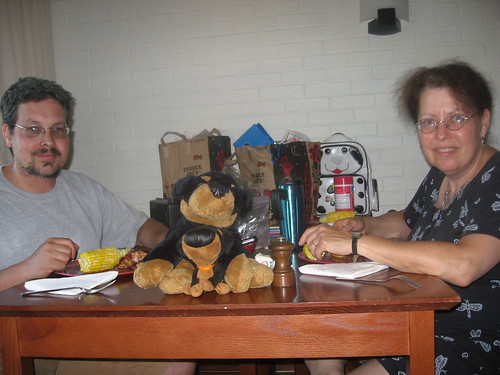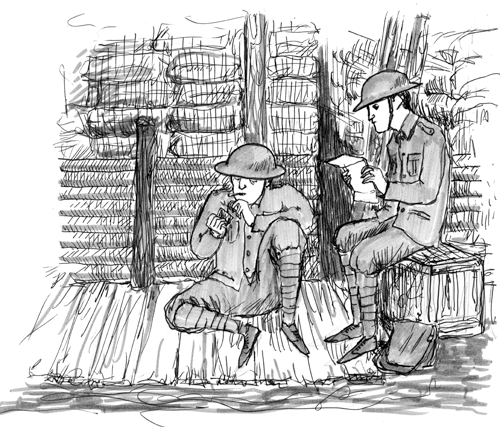|
|
Sunday, November 22nd, 2009
Spent the weekend in Atlantic City with Ellen's family -- happy 90th birthday, Lou! Here is a picture I took of Ellen and Sylvia on the boardwalk last night, that I'm pretty happy with: This reminds me a lot of the picture I took of Sylvia early last year:...Leads me to the conclusion that sunsets are just generally very pretty and a very good subject for photography.
posted afternoon of November 22nd, 2009: Respond
➳ More posts about Ellen
|  |
Wednesday, November 18th, 2009
Ellen sent me a link to this beautiful poem, written by her old teacher Raymond Federman at the very end of his life, in the spring time:
A Matter of Enthusiasm
I am rereading Malone Dies
just to mock death a little
and boost my cancerous spirit.
I shall soon be quite dead at last
Malone tells us at the beginning
of his story.
What a superb opening
what a fabulous sentence.
With such a sentence
Malone announces his death
and at the same time delays it.
In fact all of Malone's story
is but an adjournment.
Malone even manages
to defer his death
until the end of eternity.
That
soon is such a vague word.
How much time is soon?
How does one measure soon?
Normal people say
I'll be dead in ten years
or I'll be dead before I'm eighty
or I'll be dead by the end of this week
Quite dead at last
Malone specifies.
Unlike Malone prone in bed
scribbling the story of his death
with his little pencil stub
normal standing people
like to be precise
concerning their death.
Oh how they would love
to know in advance
the exact date and time
of their death.
How relieved they would be
to know exactly when
they would depart from
the great cunt of existence
in Malone's own words
to plunge into the great lie
of the afterlife.
How happy they would be
if when they emerge into life
the good doctor
or the one responsible
for having expelled them
into existence
would tell them you will die at 15:30
on December 22, 1989.
Could Sam have written
I shall soon be quite dead at last
had he known in advance
when he would change tense?
Certainly not
because as Malone tells us
a bit further in his story
I shall die tepid
without enthusiasm.
Does that mean on the contrary
of those idiots on this bitch of an earth
who explode themselves with fervor
to reach the illusion of paradise
while taking with them other mortals
that Malone's lack of enthusiasm
towards his own death is a clever way
of delaying the act of dying?
A lack of enthusiasm for something
is always a way of postponing
the terms of that something.
The soon of Malone mocks
the permanence of death
and his lack of enthusiasm
ridicules the expression at last.
And so before he reaches the end
of the first page of his story
Malone has already succeeded
in postponing his death to
Saint John the Baptist's Day
and even the Fourteenth of July.
Malone even believes he might be able
to resist until the
Transfiguration
not to speak of the Assumption
which certainly throws some doubt
as to what really happened
on that mythical day
or what will happen to Malone
if he manages to hang on until then.
In fact Malone defies his own death
by giving himself
birth into death
as he explains at the end of his story.
All is ready. Except me. I am being
given, if I may venture the expression,
birth to into death, such is my impression.
The feet are clear already,
of the great cunt of existence.
Favorable presentation I trust.
My head will be the last to die.
Haul in your hands. I can't.
The render rents, My story ended
I'll be living yet. Promising lag.
That is the end of me. I shall say I no more.
Nothing more to add this evening.
Malone said it all for me.
I can go to sleep calmly now.
Good night everybody.
I thank Robert Archambeau of Samizdat blog for sharing this poem, and Ellen for sending it to me.
posted evening of November 18th, 2009: Respond
➳ More posts about Samuel Beckett
|  |
Sunday, November 15th, 2009
It is getting much easier in the last fifth of Museum of Innocence to relate to Kemal as a human being rather than a monster... Enough so that I get a little sympathetic thrill of suspense at the end of chapter 78, when he says
So I got back into bed, and happily imagining that she would soon return, I fell asleep. All through the chapter I have been thinking Wait, why is this not the "happiest moment" of his life?... I was speculating that possibly Kemal's repeated efforts to define "happiness" and to see how he can make it apply to his life, are a marker for the westernized nature of his worldview and of the circles he moves in -- with reference to Fazıl's statement in Snow that he must be an atheist -- i.e. westernized -- because "I don't care about anything except love and happiness."
posted evening of November 15th, 2009: Respond
➳ More posts about Museum of Innocence
|  |
|
I'm a little over a quarter of the way through my rough draft translation of El viaje -- whether I end up revising it into something actually readable or no, it is a very useful exercise from the standpoint of helping me read the story -- it brings the imagery really sharply into focus, this process of reading the passage, sort-of understanding, setting out to render it in my own language, looking up unfamiliar terms, reading again... Goytisolo's punctuation of dialog (which seems to be shared pretty generally in the Spanish stories I've been reading) is to set quoted text off with em dashes -- I've been using this in the translation although it's possible that quotation marks would read more naturally. Not sure about that yet. Here is a passage of dialog I liked a lot, at the end of a drunken rant in which a circus impressario is assuring some of his performers (who have been stuck in this AndalusÃan town for several months without any money to pay for carriage) that he's got feelers out, he's going to get them passage to Lisbon, he's going to pay everybody...
The man took the bottle by its neck and guzzled another slug. His face was soaked in sweat and he was drumming his fingers on the top of his boot.
--People today, only interested in the vulgar --he said, looking at us--. The movies, every day at the movies... The work of an artist counts for nothing...
His tongue was giving him trouble with speaking and he looked around him, his gaze full of irritation.
--I had offers from Algeciras, from Tangiers, from Morocco, and I preferred to come here... They told me that in this town people appreciate art and now look... A sacrifice in vain... Like mixing margaritas for swine...
He was too drunk to go on and he hid his head between his hands. The waiter went and came back with the bottles and, passing by us, gave a wink.
--Don't pay him any attention... Every day it's like this.
Just then, the clock on the town hall struck nine.
It was time to go back; we got up.
The very brief paragraphs and heavy use of ellipses are characteristic of the story. I read a quote from Goytisolo somewhere that he considered Marks of Identity (1966, so half a decade after this) his "first real novel" -- maybe I should put that on my list.
posted evening of November 15th, 2009: Respond
➳ More posts about Juan Goytisolo
|  |
Saturday, November 14th, 2009
I'm glad I watched La Pointe-Courte when I did, as I'm now seeing loose parallels between it and everything I am reading... Sort of the archetypal melancholy romance.
Paco se habÃa sentado en cuclillas, algo más lejos y antes de abandonarme del todo, le pregunté:
--¿De qué vive la gente aqu�
Se entretenÃa en escurrir la arena entre sus dedos y no levantó, siquiera, la cabeza:
--De la pesca.
--¿Y tú? --Me extendà boca arriba y cerré los ojos--. ¿Qué quieres ser?
Su respuesta, esta vez, llegó en seguida:
--Mecánico.
Me dormÃ. TenÃa conciencia de que, al cabo de unas horas, olvidarÃa la fatiga del viaje y no deseaba otra cosa que cocerme lentamente, cara al sol.
En una o dos ocasiones, me desperté y vi que Dolores dormÃa también.
Con la vista perdida en el mar, Paco hacÃa escurrir aún la arena entre sus dedos.

Paco was squatting a bit further down the beach; before giving myself up to sleep, I asked him:
--What do people live on, here?
He was distractedly letting the sand run through his fingers; he didn't even raise his head:
--On fish.
--And you? --I turned my mouth up(?) and closed my eyes--. What do you want to be?
His response, this time, came directly:
--Mechanic.
I slept. I was aware that after a few hours, I'd forget the fatigue of the journey; I didn't want anything besides to let myself bake slowly, my face to the sun.
Once or twice, I woke up and saw that Dolores was sleeping too.
His gaze lost in the sea, Paco was still letting the sand run between his fingers.
I'm thinking I will work on a full translation of this story.
posted morning of November 14th, 2009: Respond
➳ More posts about Readings
|  |
Friday, November 13th, 2009
A book of short stories by Juan Goytisolo, Para vivir aquà (1960, and containing the story La guardia that I was reading a couple of weeks ago), arrived in the mail this week, and I have been reading bits and pieces of it. The first two stories did not really grab me but as I look at the beginning of the third I am feeling pretty interested.
The journey
El cartel indicador se alzaba al final de la recta, con las letras pintadas de blanco, sobre el yugo y las flechas descoloradas. Desde la carretera se divisaba de nuevo el mar, liso y como bruñido por el sol y, más cerca, una zona cubierta de rastrojeras se extendÃa hasta los muros cuarteados de la fábrica en ruinas. A un extremo del campo, dos hombres batÃan la paja con sus bieldos. Era casi las doce y la calina que envolvÃa el paisaje, inventaba caprichosas espirales de celofán sobre el asfalto medio derretido.
Dolores frenó más allá del cartel y nos detuvimos a mirar, junto a la cuneta. El pueblo se extendÃa sobre una pendiente escalonada de terrazas y la cúpula de mosaico de la iglesia reverberaba a la luz del sol. De no ser por el bullicio y griterÃo de los chiquillos, se hubiera dicho que nadie vivÃa en él. Muchas casas estaban desmoronadas o en alberca, y sus fachadas maltrechas testimoniaban la existencia de una época de prosperidad y trabajo de la que la chimenea agrietada del teso y los restos alcinados de un molino constituÃan un recuerdo nostálgico. Ahora, toda la vida parecÃa concentrarse en el mar, y el puerto abrigaba medio centenar de embarcaciones protegidas por un espigón de obra, liso y curvado como una hoz.
-- ¿Qué te parece? --dije, señalando con el brazo, hacia el mar. --Como sitio tranquilo, lo es --repuso Dolores, sin gran entusiasmo.
Translation attempt below the fold.

The sign was up at the end of the block, with letters painted in white, over the cross-piece(?) and the faded arrow. From the road you could see the ocean again, flat and as if burnished by the sun and, closer in, a stubbled region stretched to the broken-down walls of a factory in ruins. At one end of the field two men were beating straw with their winnowing-forks. It was almost noon and the haze that shrouded the landscape was making up capricious spirals of cellophane above the half-melted asphalt.Dolores slowed down a bit by the sign and we turned to look, close by the ditch. The town extended across a spreading, terraced slope and the tile cúpola of the church reflected the sunlight. By not being a-bustle, full of children's cries, it let us know there was no one living in it. Many houses were dilapidated or fallen down(?), and their beaten-down façades were testament to there having been an epoch of prosperity and work, of which the cracked chimney at the top(?) and the remnants of a windmill constituted a nostalgic reminder. Now, all the life appeared concentrated in the sea, and the port sheltered half a hundred vessels, protected by a breakwater, smooth and curved like a sickle. --How does it look? --I said, gesturing with my arm toward the sea. --Like a peaceful spot, I guess --replied Dolores, without much enthusiasm.
↻...done
posted evening of November 13th, 2009: Respond
|  |
Calm but amazed, I said nothing: It was as if I had never noticed before what a strange shape my life had taken.
This is a really startling admission by Kemal so late in the story (chapter 75). Much of the first 400 pages of the book has been him apologizing for and justifying the weird shape of his life -- legalistic attempts to define the good life so that it will include his odd self-deception. But this line strikes me as really sincere, I can sympathize with him here without feeling hypocritical.
posted evening of November 13th, 2009: Respond
➳ More posts about Orhan Pamuk
|  |
Thursday, November 12th, 2009
At Skytopia, Daniel White has written up a 3-dimensional extension of the Mandelbrot set, with extraordinary renderings of it at different levels of magnification, and with different parameters to the equation.
I am finding it easy to imagine jumping into this, climbing around on it like a toddler on an endless jungle gym. ...And, there looks to be a whole lot of other engaging stuff on the site, I haven't really started to look it over yet. Thanks for the link, Russ!
posted evening of November 12th, 2009: Respond
➳ More posts about Pretty Pictures
|  |
Wednesday, November 11th, 2009
Happy Armistice Day! (And to our Latvian readers, happy Lāčplēsis Day!) The guns of August have ceased their roar. A good time to hope that we will see an end to the wars that plague our world today.
posted evening of November 11th, 2009: Respond
|  |
|
On today's Leonard Lopate show, Orhan Pamuk talks with Lopate about Museum of Innocence. They cover much of the ground that Pamuk and Andreou were talking about on Monday, and go into a bit more detail -- Lopate is the better interviewer. Lopate asks about the choice of the term "Innocence", which is something I have been wondering about myself. They also touch on Pamuk's cameos in the novel (he calls them "Hitchcock-like roles"), and on the museum Pamuk is building.
Pamuk will be reading and signing books this evening at the Barnes & Noble in Union Square.
 Very nice to hear: the subject of Pamuk's next novel will be a street vendor in Istanbul.
posted evening of November 11th, 2009: Respond
| Previous posts
Archives  | |
|
Drop me a line! or, sign my Guestbook.
•
Check out Ellen's writing at Patch.com.
| |
















